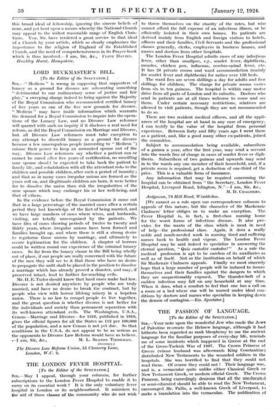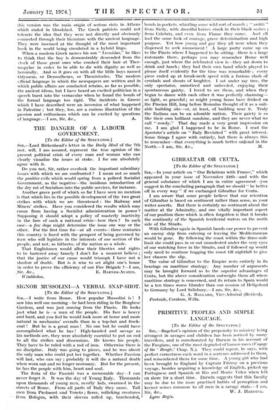THE PASSION OF LANGUAGE.
[To the Editor of the SPECTATOR.] Sra,—Your note upon the wonderful Jew who made the Jews of Palestine re-create the Hebrew language, although it had hitherto been regarded as rank blasphemy to use the ancient language for the familiar purposes of every-day life, reminds me of some incidents which happened in Greece at the end of the Greco-Turkish War of 1897. The Crown Princess of Greece (whose husband was afterwards King Constantine) distributed New Testaments to the wounded soldiers in the hospitals. She was horrified to find that they could not read them. Of course they could not ! Their language was, and is, a vernacular quite unlike either Classical Greek or New Testament Greek, or modern official Greek. The Crown Princess, being exceedingly desirous that all the uneducated or semi-educated should be able to read the New -Testament, encouraged Mr. Pallis, a well-known Greek of _Liverpool, to make a translation into the vernacular. The publication. of
this version was the main origin of serious riots in Athens which ended in bloodshed. The Greek patriots could not tolerate the idea that they were not directly and obviously connected through their literature with the ancient language. They were incensed at the thought of the most important book in the world being circulated in a hybrid lingo.
When a modern Greek names his son "Leonidas," he likes to think that the boy is demonstrably descended from the Elock of those great ones who combed their hair at Ther- mopylae in order to be able to die with dignity as well as heroically. And So it goes on with all the little boys named Odysseus, or Demosthenes, or Themistoeles. The modern official language in which the newspapers are written and in which public affairs are conducted retains, as far as possible, the ancient idiom, but I have heard an excited politician in a speech burst into the vernacular when he found the bonds of the formal language too rigid. The incidents in Greece which I have described were an inversion of what happened in Palestine ; but they, too, are a curious illustration of the passion and enthusiasm which can be excited by questions







































 Previous page
Previous page